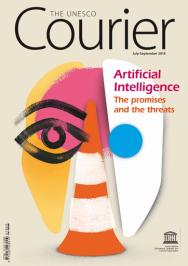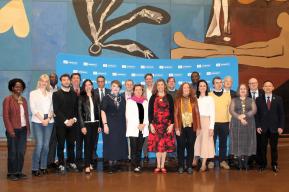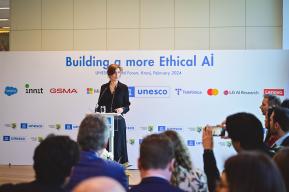مقال
لنتعلّم العيش في عصر الذكاء الاصطناعي

مع الركائز الأساسيّة الثلاث للنظام التربوي – القراءة والكتابة والحساب – يجب مُستقبلا إضافة ثلاث ركائز أخرى: التعاطف والإبداع والفكر النقدي. هذه الكفاءات التي تُكتسب عادة خارج الإطار المدرسي، لا بد من إدراجها في البرامج التعليمية بالتزامن مع اكتساح الذكاء الاصطناعي للمجتمعات.
بقلم ليسلي لوبل
في سنة 2018، سيدخل 300.000 طفل للمدارس الأسترالية. وإذا تخرّجوا منها حاملين لشَهاداتهم سنة 2030، فسوف يُقضّون أهمّ فترات حياتهم المهنية في النصف الثاني من القرن الحادي والعشرين، وقد يبقى البعض منهم على قيد الحياة في فجر القرن الثاني والعشرين. والأرجح أنهم سوف يعيشون ويشتغلون في عالم مغاير تماما لعالمنا، نظرا لنسق التغيّرات التي تحدثها التكنولوجيا المُتقدّمة. وعليه، لا بد أن تستبق الأنظمة التربوية من الآن هذه التغيّرات وتبادر بتأهيل الأجيال القادمة، لتضمن لهم رفاهية العيش.
وتُمثّل ولاية ويلز الجنوبية الجديدة التي تعد أكثر من مليون طفل وشاب يدرسون في 3000 مؤسسة تربوية، أكبر مركز للتعليم في أستراليا. في كل يوم وفي كل صف، يُوجد مُدرس يُعلّم التلاميذ ويقودهم نحو مستقبلهم. إلا أن التغيير على مستوى النظام التربوي، خاصّة بمثل هذا المقياس، يُمكن أن يكون بطيئا، رغم الحاجة الملحة والمتزايدة الناتجة عن التكنولوجيا الحديثة.
لذلك، قامت وزارة التربية في ولاية ويلز الجنوبية الجديدة سنة 2016 ببعث مشروع التعليم في سبيل عالم مُتغيّر. ومراعاةً للتبعات الاستراتيجية للتقدم التكنولوجي، تهدف هذه المبادرة الهامّة إلى التشجيع على إصلاح برامج التعليم والتقييم، وإلى توجيه النظام برمته نحو منهج يكون أكثر تجديدا.
ومنذ انطلاق هذا المشروع، فتحت الوزارة حوارا مع كبار الفاعلين العالميين في المجالات الاقتصادية والتكنولوجية والأكاديمية، أدّى في نوفمبر 2017 إلى نشر كتاب مشاغل الغد: التعليم من أجل عالم الذكاء الاصطناعي، وهو كتاب يستشرف التربية في عالم يطغى عليه الذكاء الاصطناعي. وفي أواخر سنة 2017، انتظم ملتقى دوليّ حضره المساهمون في هذا الكتاب وعدد من الأخصّائيين في علوم التربية، وكذلك ممثلون عن منظّمات غير حكومية ومسؤولون سياسيّون، قصد دراسة الوسائل الكفيلة بتحسين الدعم للمُدرّسين وتحسين نتائج التلاميذ بفضل الأدوات الجديدة، وخاصّة منها التكنولوجية. وقد أثارت هذه الأفكار الجديدة تعهّدا موحدا بتحقيق الإصلاحات.
الركائز الجديدة
القراءة والكتابة والحساب هي الركائز الثلاث التي يعتمد عليها التعلّم، إلا أن التلاميذ أصبحوا اليوم في حاجة إلى كفاءات أساسية أخرى وكفاءات هامّة غير معرفية، مثل الإحساس بالمقدرة الذاتية، وإدراك أفضل للمفاهيم، وقدرات جيدة على مقاومة الضغط وعلى التأقلم والمرونة.
وسوف تصبح الكفاءات الخصوصية للإنسان أكثر أهمية من أي وقت مضى، في هذا العالم الجديد الذي يتشكل أمام أعيننا: سيكون التفكير النقدي إحدى أولى الكفاءات التي يجب على النظم التربوية ترسيخها.
في الوقت الحاضر، يمكن اكتساب هذه الكفاءات الأساسية من خلال الأنشطة التي يقوم بها التلميذ خارج الإطار المدرسي حيث يتعلّم، على سبيل المثال، التعاون، ورسم الأهداف، والتخطيط. بالإمكان تطوير الانضباط وروح الفريق الواحد عند تعاطي الرياضة، والإبداع عند ممارسة المسرح، والفكر النقدي عند تنظيم الحوارات، والتعاطف عند القيام بالعمل التطوّعي ضمن جمعيّة.
ويكمن التحدّي في هيكلة هذه الكفاءات المتعددة التي يجب على الشاب أن يكتسبها، وكذلك في إقرار شرعيتها ضمن النظام التربوي، وإدراجها في البرامج المدرسية، وتحديد طريقة تقييم نتائج التلاميذ في تلك المجالات التي لم تكن إلى حدّ الآن تُعتبر جزءا من التعليم المدرسي والتي يجب أن تحتلّ في المستقبل المرتبة الأولى.
وممّا لا جدال فيه، هو أن المستقبل سوف يفرض على الأطفال، أكثر من أي وقت مضى، أن ينسجوا علاقات مشتركة وأن يدعموا روح الانتماء إلى المجموعة وروح المواطنة والتعاون على أساس شعور التعاطف الذي يعتبره البعض إحدى الكفاءات الأساسية في القرن الحادي والعشرين.
إن القدرات في مجال العلاقات بين الناس أصبحت تعتبر أكثر فأكثر عنصرا أساسيا في الأنظمة التربوية في العالم. وتقوم كل من اليونسكو ومنظمة التعاون الاقتصادي والتنمية بتهيئة أطر ومعايير وتقييمات في هذا المجال، وخاصّة في ما يتعلق بمفهوم «الكفاءات العالمية» الذي يرمي إلى تعزيز التعاون بين الثقافات. في أستراليا، تمّ سنة 2009 إدراج مجموعة من المُؤهِّلات العامّة في برنامج التربية الوطنية، مثل التفكير النقدي الخلّاق والتفاهم بين الثقافات. وهو مثال احتذت به عديد الولايات الأخرى في البلاد.
وقد ركّز مشروع التعليم في سبيل عالم مُتغيّر على ضرورة تشجيع الممارسات البيداغوجية المبتكرة التي من شأنها أن تعود بالفائدة على مجمل النظام التربوي. وقد بدأت تبرز داخل الأوساط التربوية ممارسات خلّاقة، تهدف إلى تحفيز التلاميذ واستغلال إمكانيات التكنولوجيا المتقدمة لتحسين أدائهم. وبما أن بعضها يعتمد على إثباتات علمية موثوقة أكثر من غيرها، يصعب حاليّا معرفة أيّها الأكثر نجاعة.
الذكاء الاصطناعي في قاعة الدراسة
وبعد أن تبنت وزارة التربية في ولاية ويلز الجنوبية الجديدة الابتكارات الوطنية والدولية الأكثر فعاليّة في القطاعين الخاص والعمومي، شرعت في دراسة أفضل السبل لتقديم الدعم للمختصين في التربية قصد صياغة هذه الأفكار الخلّاقة والتعجيل بها. والهدف من ذلك هو إيجاد مناهج جديدة ومستدامة وقابلة للتطوير تسمح بتحسين التعلّم والنهوض بقدرات التلاميذ وضمان نجاحهم.
يضطلع الذكاء الاصطناعي بإمكانيات بالغة في مجال التعليم، شريطة أن يُستعمل بدراية ووفق حاجِيات المُدرّسين. وتوجد حاليا أنظمة ترتكز على الذكاء الاصطناعي قادرة على توفير تعلّم مطابق لخصوصيات الشخص، ممّا يُخفّف بعض الأعباء على المُدرّسين ويسمح لهم بالتركيز على الحاجيات الفردية للتلاميذ وعلى الأهداف البيداغوجية. هذه الأنظمة قادرة على متابعة مدى التزام التلاميذ وتقدّمهم، كما قد تكون مُستقبلا قادرة أيضا على اقتراح تعديلات في المضمون.
إنه من الأهمية بمكان أن تبقى عملية تصميم هذه الأنظمة وتطويرها بين أيدي المُربّين. ويعود بالدرجة الأولى إلى المُدرّسين ومديري المؤسسات، الذين سيتلقّون التكوين المناسب، أن يُحدّدوا بوضوح مكانة الذكاء الاصطناعي في قاعة الدراسة. ولا بد أيضا من تشريك التلاميذ في اتخاذ القرارات في هذا المجال، وبالتالي لا بد من تعليمهم الجوانب الأخلاقية. إن مستقبلهم مُرتبط بالسياسات والمناهج التي سوف نعتمدها اليوم.
المزيد من المعلومات
مشروع التعليم في سبيل عالم مُتغيّر
الصورة: فنسان فورنياي
By Leslie Loble
In Australia, 300,000 children begin their school journey this year, in 2018. Graduating from school in 2030, they will spend most of their working lives in the second half of the twenty-first century – some may even live to see the dawn of the twenty-second century. The pace of change wrought by advancing technologies makes it increasingly likely that these children will live and work in a world that is radically different from ours. Education systems must move swiftly to anticipate and adjust to this change if these future generations are to thrive.
New South Wales is the largest school education sector in Australia, with over a million children and young people attending some 3,000 schools. In every classroom, every day, a teacher instructs and guides these students toward their future. But at a system level, especially one of this scale, change can be slow to evolve, even with the mounting and clear urgency that new technology brings.
This is why the New South Wales (NSW) Department of Education initiated Education for a Changing World in 2016. Examining the strategic implications of technological advances, this comprehensive project aims to stimulate and inform necessary reforms in curricula, teaching and assessment, and to orient the entire system towards a more innovative approach.
Since the project began, the Department has engaged with global leaders from the economic, technology and academic spheres, deliberations which led to the publication of Future Frontiers: Education for an AI World in November 2017. The book explores the future of education in a world with AI, and the skills needed to thrive in the twenty-first century. Some of these thought leaders got together with educationalists, non-government organizations (NGOs) and policymakers at an international symposium in late 2017 to discuss how to use new technologies and tools to support teachers and improve student outcomes. The infusion of new ideas led to a unified commitment to reform.
The new Rs
The three Rs – reading, writing and arithmetic – are the foundation of all learning, but today’s students need additional core skills and important non-cognitive skills such as self-efficacy. The pace and breadth of technological change demands a deeper understanding of concepts, and a great deal of resilience, adaptability and flexibility for students, teachers and education systems as well.
Human skills will be more important than ever in the new world taking shape before our very eyes – critical thinking will be one of the most powerful skills that education systems will impart to students.
For the time being, these essential skills can be acquired through extra-curricular activities, where we learn about cooperation, goal-setting and planning, for example. Discipline and team spirit could be developed through sports, creativity through drama, critical thinking through debate, and empathy through fundraising for the Red Cross or volunteering at a youth group.
The challenge is how to create this wide range of opportunities for all students, how to value them as legitimate experiences and integrate them into our curricula, and how to assess students in these domains – which were previously not considered part of school education.
One thing is certain – the future will demand that children develop connections with one another and foster a sense of community, citizenship and collaboration based on empathy, which some believe is a key competency for the twenty-first century.
Interpersonal competencies are increasingly recognized as a crucial component for education systems around the globe. Organizations including UNESCO and the Organisation for Economic Co-operation and Development (OECD) are developing frameworks, standards and assessments for intrapersonal competencies, and concepts such as global skills to support greater cross-cultural collaboration. In Australia, a set of general capabilities including critical and creative thinking and intercultural understanding were included in the national curriculum in 2009 – since then, many jurisdictions have added them to their own curricula.
The Education for a Changing World project has highlighted the imperative to foster innovative education practices that will lead to widespread gains across the system. Already, these novel practices are springing up across the education community, seeking to motivate, engage and challenge students, and to harness the potential of advanced technology to lift their performance. Some of these practices have a stronger evidence base than others, which makes it difficult to distinguish which ones are the most effective.
AI in the classroom
Drawing on lessons from national and international innovation best practices within the private and public sectors, the NSW Department of Education is examining how to better support educationalists to develop and accelerate innovative ideas. The aim is to establish new ways to create sustainable and scalable methods to extend the learning, capabilities and achievements of our students.
AI offers significant potential within education, if used wisely and if it serves the needs of educators. Already, there are AI-based systems that can support personalized learning, freeing up teachers to focus on individual student needs and educational leadership. These systems are able to monitor student engagement and progress, and potentially suggest adjustments to content.
It is crucial that educators are in the driver’s seat when it comes to designing and developing AI-based systems. Teachers and school leaders must play a critical role in defining a clear purpose for AI in the classroom, and be trained to understand and utilize it effectively. Students must also be involved in decisions about the use of these technologies and educated about the ethical frameworks that accompany their use. Their future will depend on the policies and approaches that are adopted now.
Photo: Vincent Fournier
Leslie Loble
Deputy Secretary in the New South Wales Department of Education, Leslie Loble (Australia) has led strategy, reform and innovative delivery in Australia's largest and most diverse education sector for nearly two decades. She was awarded the Australian Financial Review/Westpac Top 100 Women of Influence in 2013 for her positive impact on Australian public affairs and in recognition of her role in education reform.








